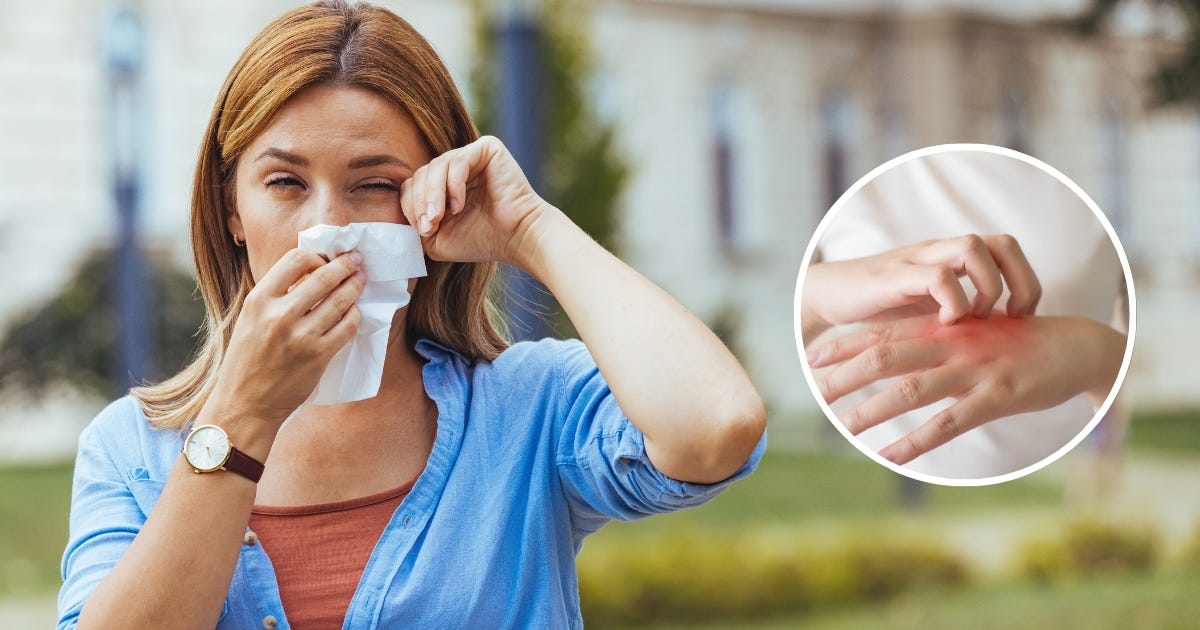The Itch After the Pill: Why Allergy Medications May Worsen Symptoms
Here’s what Big Pharma won’t tell you—and what you can do naturally instead.
This article originally appeared on sayerji.substack.com and was republished with permission.
Guest post by Sayer Ji
Why millions may be trading seasonal allergy symptoms for a new kind of suffering—and how natural remedies offer a safer path forward.
The Allergy Epidemic and the Quick-Fix Mentality
Allergies are no longer a seasonal inconvenience--they're a chronic epidemic. An estimated 60+ million people in the U.S. suffer from allergic rhinitis, often resorting to antihistamines like cetirizine (Zyrtec) and levocetirizine (Xyzal) as daily relief. These drugs, once only available by prescription, are now found in nearly every household medicine cabinet.
But new FDA findings suggest that for some, the price of symptom relief may come at the cost of quality of life--and may even worsen once you stop the drugs.
FDA Issues Warning: Pruritus After Discontinuation of Common Allergy Meds
In May 2025, the FDA released an urgent safety warning concerning a "rare but sometimes serious" condition linked to cetirizine and levocetirizine: severe itching after stopping the drugs1.
The medical term is pruritus, and the cases reported were no minor nuisance. Many described widespread, intense, and persistent itching, often developing within a few days after ceasing the medication. In some cases, the condition was so unbearable that patients resumed the medication just to stop the itch1. For others, it resulted in skin damage, open sores, difficulty sleeping, and serious impacts on daily function1.
The FDA has revised the prescription guidelines and mandated new warning labels on over-the-counter (OTC) versions of these drugs. As of 2022, more than 62.7 million packages of cetirizine and levocetirizine were sold in the U.S. alone1.
Notably, the FDA acknowledges that the true number of cases is likely higher, as the 209 officially documented cases represent only those reported to the agency.
What's Going On? The Mystery Behind the Itch
The mechanism behind the rebound pruritus remains unclear. According to the FDA's summary, the phenomenon primarily affects those who had been using the drugs daily for months or even years. None of the affected individuals reported itching prior to initiating the medication1.
Some experts speculate that long-term antihistamine use may disrupt histamine receptor regulation, causing the body to react excessively once the drug is removed. This scenario mirrors other pharmaceutical withdrawal syndromes, where biological compensation mechanisms go awry after suppression.
The Bigger Picture: Symptom Suppression vs. Immune Balance
The rebound itching from these drugs is a stark example of what happens when treatment aims solely at symptom suppression rather than immune modulation. Natural medicine, by contrast, focuses on supporting the body's own adaptive responses to allergens--restoring rather than repressing function.
Top Natural Alternatives for Allergy Relief
Here are five clinically backed natural interventions that provide effective relief, often without the rebound effects seen with pharmaceuticals:
1. Quercetin
This powerful flavonoid, found in apples and onions, has been shown to stabilize mast cells and reduce histamine release2. One study noted its effectiveness in lowering both sneezing and nasal discharge in allergic rhinitis patients. Notably, quercetin has been studied as a potential therapeutic intervention in over 200 health conditions (see the research on Greenmedinfo.com).
2. Stinging Nettle (Urtica dioica)
Long used in folk medicine, stinging nettle demonstrates COX-1 and COX-2 inhibition, similar to NSAIDs, but with fewer side effects. A controlled study found 58% of users reported symptom relief3.
3. Butterbur (Petasites hybridus)
In a landmark trial, butterbur extract was found to be as effective as Zyrtec in treating seasonal allergies--without sedation4. Only PA-free extracts should be used due to the liver toxicity of unprocessed plant forms. View 20 related studies here.
4. Probiotics
The gut-immune axis plays a crucial role in allergic disease. Probiotic strains like Lactobacillus rhamnosus and Bifidobacterium lactis have been shown to modulate Th2 immune responses and reduce allergic inflammation5. (Probiotics have been studied to have potential therapeutic value in over 400 conditions, according to the research on the GreenMedInfo.com database.)
5. Neti Pot and Nasal Irrigation
Saline rinsing of the nasal cavity helps clear allergens and mucus. Clinical trials show reduced congestion, sneezing, and antihistamine use among regular users6.
Over 200 Natural Solutions: The GreenMedInfo Allergy Research Database
The scientific literature supports hundreds of natural substances with documented anti-allergic properties. From vitamin C and spirulina to bromelain and black seed, the options are plentiful and often safer.
Explore the full GreenMedInfo database on allergy-related natural substances
Conclusion: The Itch That Teaches a Lesson
The rise of pruritus as a withdrawal symptom from common allergy drugs reveals a dangerous blind spot in pharmaceutical allergy care. When the goal is mere suppression, the body pushes back.
Natural medicine offers a different path: one that acknowledges symptoms as signals, and healing as a process of restoration, not repression. With over 200 studied options available, it's time we start asking not only what works, but what works with the body--not against it.
References
1. Sadie Whitelocks, "Millions Take These Allergy Meds... Now the FDA Says They May Worsen Symptoms," Daily Mail, May 23, 2025. https://www.dailymail.co.uk/health/article-14743449/fda-warning-effect-allergy-drugs-cause-itching.html
2. J. M. Thorne and G. S. Johnson, "Quercetin's Effects on Allergic Rhinitis: A Review," Journal of Alternative and Complementary Medicine, 2017. https://pubmed.ncbi.nlm.nih.gov/28326703
3. P. Mittman, "Randomized, Double-Blind Study of Freeze-Dried Urtica dioica in the Treatment of Allergic Rhinitis," Planta Medica, 1990. https://pubmed.ncbi.nlm.nih.gov/2319485
4. A. Schapowal, "Randomised Controlled Trial of Butterbur and Cetirizine for Treating Seasonal Allergic Rhinitis," BMJ, 2002. https://www.bmj.com/content/324/7330/144
5. A. Fiocchi et al., "Probiotics and Prebiotics in Allergy Prevention and Treatment," Annals of Allergy, Asthma & Immunology, 2015. https://www.sciencedirect.com/science/article/abs/pii/S1081120615004702
6. D. Rabago et al., "Efficacy of Daily Hypertonic Saline Nasal Irrigation in Seasonal Allergic Rhinitis," Archives of Otolaryngology, 2002. https://jamanetwork.com/journals/jamaotolaryngology/fullarticle/483515
Copyright 2025 GreedMedInfo LLC



